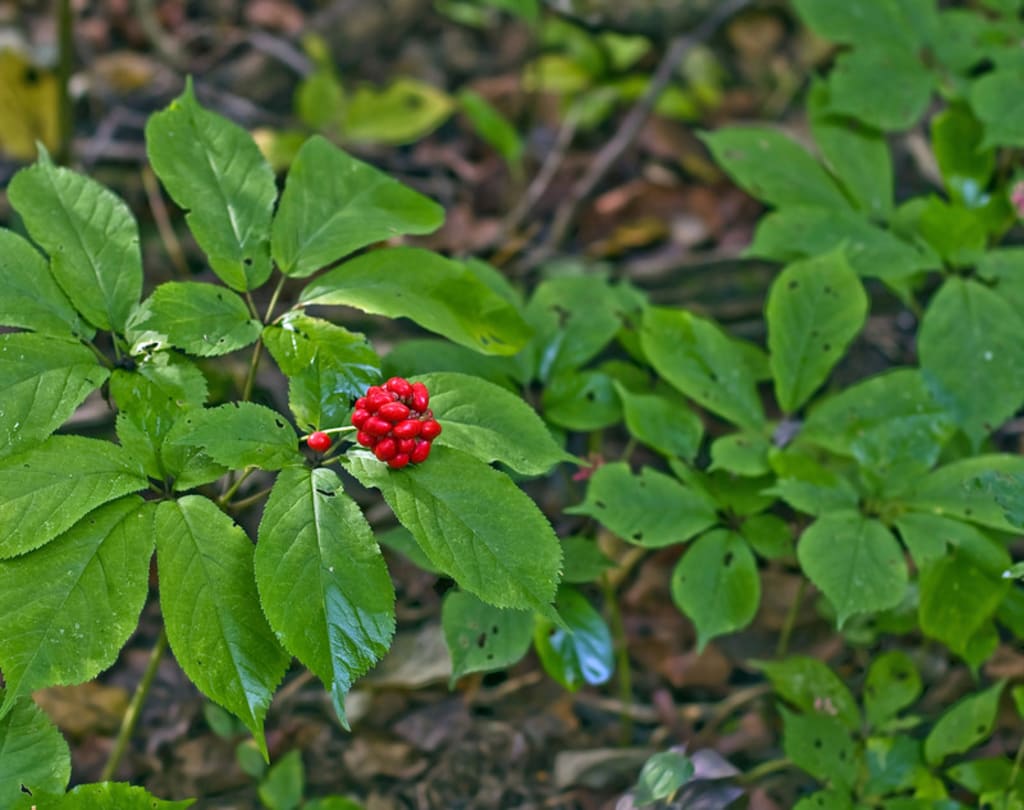
When my husband and I were dating, we found that we both had a love for the forest, mountains, and all things natural. After realizing we would be spending most of our free time in nature, we made the decision to make the most of our love for the outdoors, and try our hand at ginseng farming. After six years of sewing seed, the time has come to reap the harvest.
As a kid, my husband grew up in the poverty stricken foothills of the Tennessee Appalachian Mountains. He learned, early on, that he had to be resourceful, when it came to helping his mother with the bills. Taking advantage of the beauty that surrounded him, one day, he ventured into the forest to see what he could dig up. Later, that evening, Kevin came running in the door with Dollar General Store bags full of ginseng roots. His mother, raising three boys, learned to not be moved by their excitement, as she had gotten her hopes up before, only to shrink back into despair. On this night, however, there would be much to give thanks for at the supper table. Kevin, her middle, and most precocious child, had been digging up "green gold" and was so proud that it would be used to help his momma take care of them.
A little history, if you will allow. Ginseng has been around for centuries, first appearing in Chinese texts around 196 A.D. The botanical name, Panax, means "all-healing" in Greek, and has been described as a "Superior-tonic" for patients with chronic illnesses, as well. Ginseng has said to strengthen immune systems, improve stamina, concentration, and memory, slow the aging process, along with relieving menopausal hot flashes, depression, and anxiety. Although modern clinical research is undecided whether ginseng has any medicinal effectiveness, even though it has been shown to be very effective in traditional medicine. During the Civil War, soldiers would use ginseng to buy knives, sugar, land, and anything else that could be traded for ginseng. By 1890, after deforestation, ginseng became "as scarce as hens teeth" causing a decline in the number of plants exported to other countries. Chinese ginseng is similar to American ginseng, and exporters are willing to pay top dollar for it, especially since Chinese ginseng is almost extinct there. Once selling for $1.30 per pound, now became over $4.00 per pound. The Chinese are happy to pay the price for the treasured root that they consider almost "Holy".
I recall my very first time hunting for ginseng in the wild, for seed to plant. When I caught a glimpse of the plant, and turned only for a second, when I turned back to find it, I couldn't. It has been said that these plants can "hide" from you, if you don't pay close attention to them. When I was finally able to dig my first root, I understood why it's a tedious process. The root has water roots attached, and by keeping the water roots intact, they are more valuable. It takes 32-35 ginseng roots to make a pound. Last year, one pound of dried roots brought over $1,200. Not only can the roots be used, but the leaves, berries, stalks, and stems have healing properties, as well. There are other roots and herbs that grow in close proximity to the ginseng plant, and are used as "signs" when we are looking through the forest, such as spider ferns, dolls-eye, jack in the pulpit, etc., along with certain trees ginseng is most likely to be growing under or around, such as poplar and on the edge of cedar thickets.
Today, as I write this, my husband and I have planted over 112,000 seeds, making us forest farmers of woods-grown American ginseng. Barring plant diseases, slugs, theft, and any other thing that could happen, we will have the privilege of harvesting our first years plantings. For every acre planted with ginseng, one can yield around $250,000 worth of roots. Our love for nature has evolved into a mission to share the history of, the benefits of, and resourcefulness of this amazing plant called ginseng. In southern Appalachia, we lovingly refer to ginseng as "seng". With todays market, ginseng can be found in many products such as teas and energy drinks, all the way to high-end face creams and five star restaurants, making ginseng farming as lucrative and beneficial as ever before.
I have to say, my mother in law has raised some pretty resourceful men, not to mention hard-working. The night Kevin came running through her door with bags of "seng" was the same night he knew he had a passion for all things herbal and natural, not to mention how he loved seeing the weight lifting off his mommas shoulders. I would say, at that moment, my husband became the man of the house, as he knew his momma could depend on him made him so proud. Now, we are using our painful childhood years, added with our passion, to create a healthy and lucrative lifestyle. Ginseng farming is not for those who aren't willing to work hard, get dirty, and brave the elements, along with spider webs, snakes, and bears, among other things, as we hand-dig each individual ginseng root with tender loving care. Getting to see my husband enjoy the same things he did in his childhood to help his family, I realize how fortunate we are to have forged a path through the pain of poverty to enjoying the lifestyle we share, with resources practically in our back yard that are highly sought after.
Our first ginseng harvest will be Fall 2021, from the seeds we planted back in 2015. I can't hardly wait to see my husband come through the door, knowing his childhood pain has not been in vain, rather it birthed a passion that has, and will continue to sustain us. His resourcefulness still amazes me!





Comments
There are no comments for this story
Be the first to respond and start the conversation.